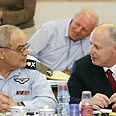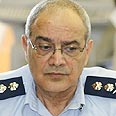

Responding to remarks made by Knesset Member Zvi Hendel (National Union-National Religious Party), who said Tuesday morning that it would be difficult for him "to see him in uniform," Halutz stated: "If this bothers you, we will find a way not to meet."
Halutz, who was slammed by some Knesset members following the war, provided firm answers.
MK Danny Yatom (Labor) asked him whether he would be able to implement the lessons in light of the large number of disputes in the different commanding ranks and in light of the resignation of the Northern Command chief.
"If I thought I was incapable of implementing the lessons, I would go home. Taking responsibility has two sides. One can take and abandon the ship, or take responsibility and fix things," Halutz said.
He stressed that "in any case, the IDF will cooperate in any inquiry process which takes place."
MK Effie Eitam (National Union-National Religious Party) asked the army chief whether the IDF was preparing a military operation in light of the strengthening of terror organizations in the Gaza Strip.
Halutz responded that "the army should be prepared for a possibility of a military operation in Gaza in order to prevent a situation in which a process takes place in Gaza which will cause us to deal with weapons of the future."
"There is no saying that we will do so, but there is a saying that we have to be ready and prepared for that too. There is a political echelon and there is a decision making process. This is not the army's decision; the army must be prepared," he added.
The army chief was later asked by MK Danny Naveh (Likud) about the IDF operation which ended the fighting in Lebanon, moments before the ceasefire.
"Do you think it should have gone through?" Naveh wondered.
Halutz gave a positive answer, implicitly pointing to the harsh remarks made by former Chief of Staff Moshe Yaalon that it was a spin for which soldiers were killed: "In my eyes we should have embarked on this move. Whoever thinks that there was a media spin should provide one piece of evidence for that. The operation was aimed at serving the UN resolution."
Reservist burden expected to grow
Halutz continued to warn the reservists of the difficulties ahead. According to him, the reservist corps will feel the burden throughout the rest of the year and next year for two reasons: The decision to increase the amount of reservist training days, and the need for the reservists to replace the regulars so they could train as well.
Earlier, Halutz revealed that a meeting is planned for the afternoon between IDF, Lebanese, and UN officers and that "if the necessary measures are taken, all Israeli troops will be out of Lebanon by the Jewish New Year."
Halutz presented the members of the Foreign Affairs and Defense Committee details showing the terror groups in Gaza are arming themselves and digging tunnels. Halutz responded to a question about the IDF's contingency plans and said that there will be a need for the IDF to act in Gaza.
The members were curious if such an action will resemble a massive ground offensive. Halutz responded that the IDF is gearing up for any response, and it is clear that drastic measures must be taken. According to him, there has not been a decision just yet, and there is nothing operational. MKs present at the meeting added that Haluts tied his words to the war in the north.
On the subject of the investigations, Halutz said that the IDF is currently in the midst of an internal investigation process and that "we are including experienced reservists in the investigation process. Preliminary results are expected to be out on October 16 and all investigations are due to end by December of this year."
Halutz also spoke about Hizbullah's deployment in the north and explained that they are rebuilding their headquarters and their bunkers.
"During the war the IDF killed between 500 to 700 Hizbullah fighters and the organization is suffering from a lack of manpower. Hizbullah still has bodies buried under the rubble. Their upper level was not hit, despite our efforts," Halutz said. He added that that in the middle levels, the IDF killed 20 to 25 Hizbullah officials.















